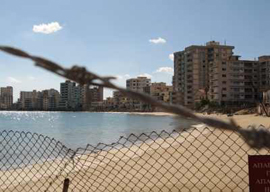
August 08, 2011

Once part of the Ottoman Empire and then ruled by the British, both Cyprus and Israel/Palestine have become central to the national mythologies of those who love their historical narratives. Greek Cypriots recently marked the “black anniversary” of the invasion by Turkey on July 20, 1974, which the island’s Turkish inhabitants recall as the Day of Liberation.
Israelis mark their own Independence Day. Palestinians commemorate the Day of Catastrophe.
Most Israelis and Palestinians are not ready to reach a “final status” agreement that would require reconfiguring their respective national and religious narratives. Palestinians will not give up the “right of return” and accept the idea of a Jewish state or agree to share Muslim control of Haram al-Sharif (the Temple Mount) with the Jews. And no Israeli-Jewish leader that subscribes to Zionism, the state’s founding ideology, will budge on Jewish statehood or sharing the Temple Mount.
The reason it is sunnier in Nicosia than in Jerusalem can be summarized in one word: partition. Cyprus’s de facto partition seems to serve all parties’ interests. Cypriot Greeks have de jure sovereignty over the entire island that was accepted into the European Union as a full member in 2004. The Turks maintain self-rule and close ties to Turkey’s thriving economy. The Greeks and/or Turks rejected various plans to settle the Cyprus dispute, and no one expects any change in the current status quo anytime soon.
Indeed, separating the Israelis and the Palestinians—even without a final status solution—could help create the environment for Cyprus-like coexistence in the Holy Land. It would require an agreement between Israelis and Palestinians to a partition along the 1967 cease-fire lines. It would require land swaps under which Israel will be allowed to annex some Palestinian areas with large Jewish settlements in exchange for Israeli territory with large Arab populations. Jerusalem’s Arab and Jewish residential and commercial areas will also be partitioned, and the religious sites will come under the UN’s control.
The arrangement would fall short of Arab and Muslim aspirations for the complete return of Arab and Muslim Palestine into the Ummah’s fold, and it likely won’t correspond to the Israeli vision of peace. But it will allow both Israelis and Palestinians to invest their energy and resources on nation-building instead of exchanging bombs and missiles. And it could lessen the international preoccupation with the Israeli-Palestinian conflict.
My advice: Israelis and Palestinians should get a divorce ASAP. And they won’t even have to hire a pricy lawyer.